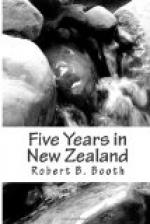On first starting we had no small difficulty in preventing them returning to the run, and it cost us some hard galloping to get them away on the road to Miller and Gooche’s, where it was our intention to yard for the night.
We had proceeded to within a mile of the station, when the brutes for the twentieth time bolted, on this occasion taking to the hills over some low spurs and rocky ground, intersected with ravines and gullies. I was riding hard to intercept them when I was suddenly sent flying on to my head, turning a somersault on to a rough bank of spear grass. Shaking myself together and somewhat recovering from the shock, I discovered the tail and stern of my steed projecting above the ground, the remainder of him being invisible. It appeared he had planted his fore feet in a deep fissure covered with long grass, and just large enough to take in head and fore parts. The shock sent me over, as I described, while he remained stuck.
It was a ridiculous position, and tired, sore from the spear-grass, and annoyed as I was, I could not refrain from a hearty laugh at our predicament before attempting to extricate my unhappy quadruped; this I succeeded in doing with some difficulty, and found him, with the exception of some few scratches, quite unhurt.
I again mounted, but the wily steers had disappeared, and Smith was nowhere to be seen, I rode quietly on and presently discovered the latter, himself and horse dead beat, and using very unparliamentary language at our bad luck, at the beasts, and at gold diggings in general.
We had nothing for it but to go back to Miller’s for the night. The following day we returned to Davis’s, where we found the bullocks had arrived the night before, and Davis, after a laugh at our misadventures, returned us the L25, and the same evening we left for Dunedin. We camped some ten miles further down the Waitaki, with a very eccentric personage in the form of an old retired clergyman of the Church of England. He lived like a hermit in a small hut under the hills, which he had built himself, as well as some outbuildings and a capital little bakery, which he was very proud of. He cultivated a small plot of ground, where he grew potatoes and other vegetables and kept a cow, and he possessed several cats and a couple of fine collie dogs. He gave food—especially bread—to any traveller passing who needed it, and free quarters for the night. He showed us a small canoe in which he was in the habit of paddling himself across the river, and was always ready to obey a call to any, even distant, station where his services were needed in a case of illness, death, or marriage. He was a most entertaining host, and we enjoyed the night we spent with him in his curious and lonely habitation. We heard that he had suffered some severe domestic calamity, which drove him to his present lonely life, but he spent his days in doing all the good that lay in his power, and doubtless many a passing traveller was the better in more ways than one for meeting the old recluse.




